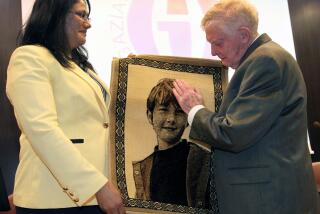From Death, a Chance for Life : Transplants: Will the compassion shown by a boy’s parents lead to more organ donations? Experts hope so.
- Share via
The 60 students at Bodega Bay Elementary School talked this week about their friend and classmate Nicholas Green, who last year played Robin Hood in the school play. Nicholas died Saturday after being shot by robbers while vacationing with his parents in southern Italy.
Teachers showed his classmates on a globe where Nicholas was when he died. The students in the three-room school, about 70 miles north of San Francisco, wanted to know why it happened, could it happen here?
They wrote letters and signed cards to the Greens. They did not ask, however, about the family’s decision to donate Nicholas’ organs so that five people--strangers in another country--might live with the help of his liver, kidneys, pancreas--his heart.
It’s a topic many people don’t talk about, and transplant officials in Southern California say there needs to be more discussions so families know what to do if tragedy strikes and they are faced with the question of donating their loved ones’ organs. The Greens made a decision few people in Italy make, a decision that potential organ recipients everywhere hope and pray for.
*
June and Darrell Williams were just finishing dinner in their El Segundo home at 5:30 p.m. Friday. Darrell had prepared stuffed peppers, reaping the harvest of the first garden he had planted in years. The telephone rang. The heart they had waited for had been found.
By 7 p.m., they were at the UCLA Medical Center, which has the largest heart-transplant program in the nation, and surgery was performed that night. The retired Santa Monica cop had waited two months for a heart--many people wait longer, many die waiting.
His history of heart problems goes back nearly 30 years. Now 66, he initially questioned whether he wanted a new heart. Perhaps it would be put to better use by a younger person. Hadn’t he already lived a full life?
Since 1966, when Darrell suffered his first heart attack at 38, June was always setting goals. Initially, she hoped he would live to see their daughter graduate from high school, then college, then to see her married, have children.
By the time he was told that he needed a transplant, Darrell had survived three heart attacks, two open-heart surgeries. He had three grandchildren now. Maybe that was enough.
“I told him it was his decision,” June says, “and that I would support whatever he decided.”
By the time the telephone rang Friday night, he had decided he would go through with the transplant. Surgery went well. June has a new goal--to retire in a few years, then travel with Darrell around the country in a motor home. Other goals are more simple: to have more gardens, more stuffed peppers.
She knows nothing about the donor of Darrell’s new heart or the donor’s family, and she doesn’t quite know what words express her swirling feelings.
“I know,” she says, “they lost a loved one.”
It almost feels wrong to feel joy. But in time, when rejection of the new heart is not such a concern, when the donor’s family has been given time to heal, she knows the words will come. Or maybe there will be another way to show her feelings. Both she and Darrell carry donor cards.
For about the past six years, the nation’s pool of donors has remained flat, about 15,000 a year, 4,800 of whom actually become donors. The others are ruled out because of communicable diseases or for other reasons making them unsuitable.
As of Aug. 31, 5,359 Californians, more than in any other state, were on the national transplant waiting list, according to figures compiled by the United Network for Organ Sharing. Nationwide, the figure was 35,806.
Eight to 10 people die each day while waiting for an organ, says Elizabeth Flynn, spokeswoman for the Regional Organ Procurement Agency of Southern California (ROPA). And every 20 minutes, a new name is added to the national waiting list.
Flynn says people who want to be donors should talk about it with their loved ones. Consent of the family is needed even with a donor card except under rare circumstances, she says.
Cynthia Rodriguez and her 24-year-old son, Luigi, talked about it a week before he was killed in a car crash June 1, 1986.
They were watching “60 Minutes,” and there was a segment about the right-to-die issue. It triggered a comment by Luigi that surprised his mother.
“He told me he had signed his donor card. I said, ‘Don’t be discussing that now.’ We were eating banana cream pie, and I slapped him and told him, ‘Don’t be talking like that.’ One week later, it was not ’60 Minutes,’ it was my son.”
When Luigi was brought out of surgery, he showed no brain activity. He was to have been married the following Saturday. Cynthia gave her consent to donate her son’s organs.
Cynthia, of Azusa, now works as a family-services coordinator for ROPA, answering questions, providing assistance for families of prospective donors.
She saw Nicholas Green’s father talking on television news during the weekend, and she flashed back to the night Luigi died.
“I saw him saying how it was a chance to make some good come out of all this, and that’s exactly how I felt.”
More to Read
Sign up for Essential California
The most important California stories and recommendations in your inbox every morning.
You may occasionally receive promotional content from the Los Angeles Times.










